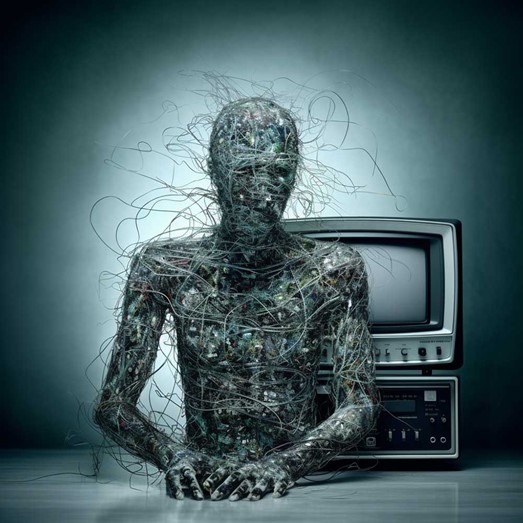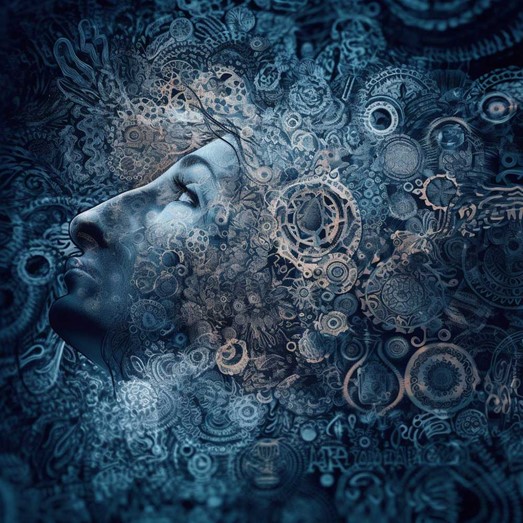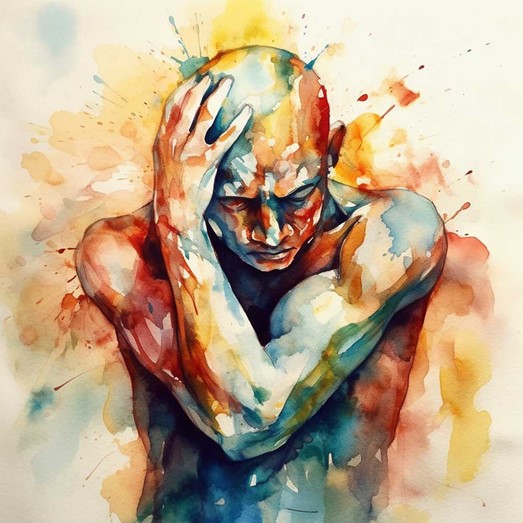If you’re struggling with anxiety, you’re not alone. Nearly half (49%) of the UK population have experienced anxiety in the past five years, according to our 2023 Public Perceptions Survey. It’s the UK’s most common mental health problem.
But despite this, only 26% of people say they would see a counsellor or psychotherapist to help cope with emotional difficulties or mental health problems.
We’ve created a collection of AI art generated from quotes describing people’s real life anxiety symptoms to prompt the public to recognise and address these feelings so they don’t suffer in silence and accept them as the norm.
These stunning images have been displayed in central London and shared with the media to raise awareness of the importance of seeking qualified support from a counsellor or psychotherapist so your anxiety does not overwhelm you.
If your daily life is being affected by anxiety, there is help available for you.
Our collection of AI generated art
"It feels like my whole body is filled with television static"

"I'm in fight or flight mode"

"I feel like I never get to sleep, lying awake all night"

"My chest feels tight like I have cling film wrapped around it and I can't take a full breath"

"All my muscles tense up and I shrink into myself"

"It feels like broken pieces of glass underfoot"

"It feels like marbles are rolling around my head incessantly"

"My stomach always churns with worry"

"I get hot flushes that feel like hot honey is slowly poured on top of my head"

"It feels like I keep holding my breath all the time"

What is anxiety?
Anxiety is a feeling of worry or fear that is a normal response to a range of different situations.
It can affect your mental health when you feel anxious every day and can’t remember when you last felt relaxed.
Anxiety can show itself in a range of physical signs, such as an increase heart rate, muscle tension, dizziness, sleeplessness and rapid breathing or hyperventilating.
It stems from our ‘fight or flight’ response which happens when our body feels as if it is in danger. This is an automatic reaction where our body releases hormones, such as adrenaline, to make us more alert.
Normally our body will release other chemicals to help us calm down after the initial adrenaline rush.
But with anxiety this tends not to happen – and we remain fearful of situations as if they are dangerous.
How can counselling help?
It’s important to understand what is causing your anxiety – then you can look at steps to address it.
Counselling can give you a safe, non-judgmental and confidential space to chat to a skilled professional about your anxiety and any other issues and concerns.
Your counsellor will help you explore your thoughts, feelings and behaviours so you can develop a better understanding of yourself and others.
They'll help you find your own solutions – whether that’s making changes in your life or finding ways of coping with problems.
How to find a counsellor for anxiety?
Although you may be able to see a counsellor through your GP or the NHS, from where you work or study, or through charities and voluntary services – you can pay to see a private BACP counsellor. This gives you a wider choice and you may be able to see someone quicker, perhaps for longer.
Why choose a BACP member?
Anyone can call themselves a counsellor or psychotherapist, so it’s important you choose a therapist who’s listed on a Professional Standards Authority accredited register – such as the BACP register. Choosing a BACP-registered counsellor gives you an assurance that they meet the standards of proficiency, training and ethical practice you would expect.
Find a BACP member who can help you with anxiety using our Therapist directory.
Find out more...

Therapist Directory
How to use our online therapist directory to search for a counsellor or psychotherapist by location, services or specialisms

Anxiety
What is anxiety? What causes it? What’s the best way to cope with anxiety? BACP accredited therapist Kamalyn Kaur shares her top tips and explains how counselling can help.

What is counselling?
Find out how counselling works, what therapists do and what happens in a therapy session.
